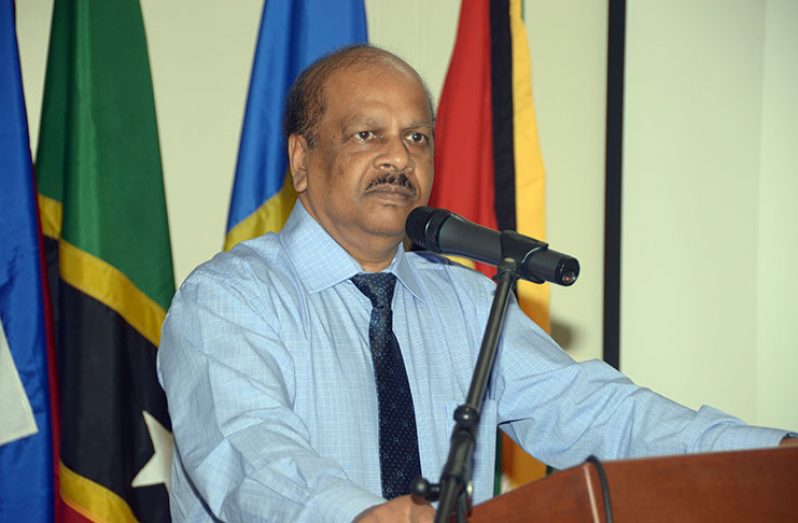…Bank of Guyana Governor tells pension supervisors
NATIONAL Insurance Schemes in the Caribbean are projected to run substantial deficits and deplete their assets in the next decades if reforms are not made, Governor of the Bank of Guyana, Dr. Gobind Ganga, said while warning that Retirement Security is already in “shaky” situation.
In his keynote address during the opening of the Caribbean Association of Pension Supervisors (CAPS) Conference at the Bank of Guyana on Monday, Dr. Ganga said the effects of population ageing will be felt as the clock continues to tick, and governments, in the case of National Insurance Schemes, would more than likely have to intervene.
Retirement Security is often compared as a three-legged stool supported by Social Security, employer-provided pension funds and private savings, and according to the Governor, in today’s society; the legs of the retirement security stool are shaky.
“This situation has resulted from population aging, slow economic growth and high levels of unemployment,” Dr. Ganga explained.

Photos by Adrian Narine
The International Monetary Fund, in its report titled ‘National Insurance Scheme Reforms in the Caribbean,’ noted that the reserves of the NIS of Guyana, Jamaica, St. Vincent and the Grenadines and Antigua and Barbuda are likely to be exhausted in 10 years if reforms are not made. Other Caribbean countries are also at risk, Dr. Ganga warned as he underscored the importance of reform at this time.
“We have heard proposals of higher levels of contributions, raising the retirement age and freezing pensions for a number of years to address the funding challenges that the NISs face. These measures, although necessary to preserve the schemes, place additional financial burden on the insured especially those in lower income brackets,” the Governor said.
In his deliberation, Dr. Ganga took note of the low level of household or private savings in the Caribbean. He said generally, low saving rates result from low levels of income but acknowledged that there are other factors influencing the rate.
“…the gap between the rich and poor has been expanding over time resulting in more households having limited ability to save. These factors have resulted in many persons reaching retirement age with little or no savings,” he added.
Turning his attention to private pension schemes, the Governor explained that that type of scheme is funded by both the employer and employee. It was further explained that subsequent to the great recession of 2008, many of the Pension Funds dried up due to loss in value of assets, reduced level of income, and growing liabilities.
Referencing to Guyana’s Statistical Bureau, the Governor pointed out that 48.3 per cent to 52.6 per cent of the Guyanese working age population is employed in the information sector, and are unlikely to be covered by a private pension scheme or by NIS, in some instances. Bank of Guyana statistics show that as of March 31, 2019, 17,195 persons or 7.75 percent of the total labour force are members of private pension schemes.
Though the future appears “dim” for future pensioners, the Governor assured the pension supervisors that “all is not lost.”
“Governments in the Caribbean and other international organisations have recognized the problems which have resulted in pension reforms in many countries. Pension legislation has been improved and expanded and supervisory bodies strengthened,” he said.
Citing Guyana as an example, the Governor said the draft Private Pensions Law introduces several new provisions in an effort to improve the regulation of pension plans.
CAPS President Nicolette Jenez, in her address, took participants back to the not-so-distant past when people’s pension assets were reduced by Jamaica’s financial crisis in the 1990’s and the CLICO collapse which took a toll on 15 countries.
Jenez noted that it was not only private pension assets that were affected but public pension schemes as well. The Caribbean people, she posited, have been ‘burnt,’ and cannot afford another ‘uncontrollable fire.’
The CAPS President underscored the importance of managing the risks associated with the pension schemes to ensure their stability.
“Some of the risks that threaten our pension plans include financial, operational, actuarial, funding or solvency as well as mismatch,” she posited, while noting that the risks have the potential to compromise the effectiveness of the supervisory framework which seeks, among other things, to minimize the failure of pension plans, facilitate an enabling environment, guarantee fair and competitive markets, and promote market stability and development.
Due to the prevailing risks, Jenez said during the conference, the supervisors would be equipped with the tools that would enable them to minimize the risks. The conference, therefore, focuses on strengthening the supervisory framework and practices, preserving retirement income through-out retirement and the provision of higher yields.
The pension supervisors were drawn from the Caribbean Region while the presenters are from the US and Canada. Director of the Bank of Guyana Insurance Supervision Division, Tracy Gibson was among the officials present. The two-day conference is being held under the theme “Regulating and Supervising Risks in an Emerging Pension Industry.”













